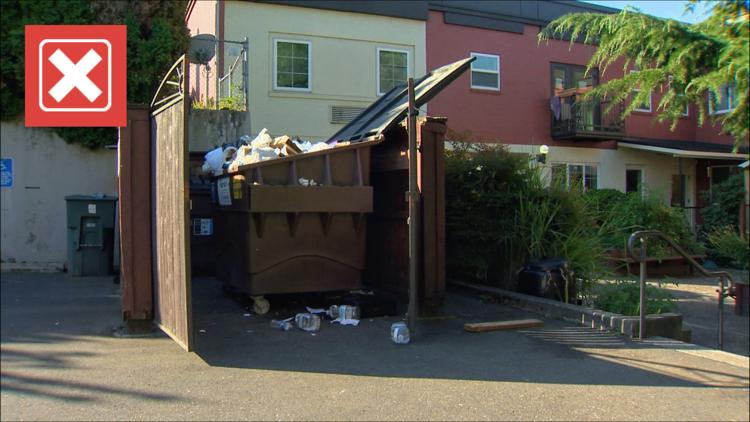PORTLAND, Ore. — An interesting question popped up on Google's trending search terms for the Portland area last week: Is dumpster diving legal in Oregon?
It's unclear what prompted people to begin looking up the rules, but a search through social media shows that this is an issue that has come up numerous times in online discussions over the years, with questions and arguments about the legality of rooting through both actual commercial dumpsters and smaller household garbage bins.
THE QUESTION
Is dumpster diving legal in Oregon?
THE SOURCES
THE ANSWER
No, dumpster diving is not legal in Oregon.
WHAT WE FOUND
To get this out of the way up front: it's definitely illegal in Oregon to dig through any trash bins or dumpsters on private property without permission, because doing so involves trespassing (and Portland also requires businesses and residents to keep their bins on private property except when put out for pickup).
Enforcement might be spotty, but it does happen — in one prominent example in 2021, Portland police threatened to arrest people for trespassing if they didn't stop rooting through the dumpster at a Fred Meyer when the store had to throw out some of its perishable products after a power outage.
Some cities also have local ordinances prohibiting the act of dumpster diving itself. Hillsboro, for example, defines it as a violation in the city's municipal code, subject to a possible $500 fine.
But what about if the bin is in a publicly accessible place, such as if it's set out on the street for pickup?
Oregon Revised Statues 459A.080 provides a straightforward answer to at least part of the question: the law directly prohibits anyone from taking recyclable material from any kind of recycling bin or container set out for collection without the permission of the bin's owner.
It's a little murkier when it comes to trash bins, but the general consensus still seems to be that it's a bad idea to dig through them, in part due to a fairly recent Oregon Supreme Court ruling.
As with most legal cases involving dumpster diving, the concern in 2019's Oregon v. Lien wasn't about random people walking off with discarded items — it was about the police walking off with potentially incriminating items, and whether that violates a person's right to not be subject to warrantless search and seizure.
In Lien, officers asked garbage haulers to pick up the defendants' garbage bin during a regular collection run and keep it separate, then turn it over to police. Police searched the bin and found evidence that they used to obtain a search warrant for the suspect's home, leading to the arrest of the defendants for drug possession.
The defendants moved to have the evidence from the garbage bin thrown out (no pun intended) because it was collected without a warrant. Lower Oregon courts denied the motion, citing two similar previous cases in which the Oregon Supreme Court had ruled that people forfeit their "privacy interests" in their trash when they put their bins out for pickup.
That's essentially where federal law stands on the matter as well. The U.S. Supreme Court took up a case with similar circumstances in 1988 and ruled that searching through a person's garbage bin at the curb doesn't violate the Fourth Amendment — though the court specifically noted that states were still free to set tougher policies.
The Oregon Supreme Court appeared to do just that when it ruled in favor of the defendants in Lien, partially overturning its two prior rulings and establishing that if someone puts their garbage within a closed and opaque bin, they retain their "privacy interest" in the contents even when the bin is put out on the curb.
The case was narrowly focused on the issue of police searches, but Justice Lynn Nakamoto's opinion does also mention that there is a general societal expectation that the contents of a garbage bin are private, and that people would "deem it highly improper for others — curious neighbors, ex-spouses, employers, opponents in a lawsuit, journalists, and government officials, to name a few" to search the bin.
Several news outlets interpreted the ruling to mean that no one, police or otherwise, can dig through a person's garbage bin on the curb. The Newport Police Department came to the same conclusion, writing in a 2019 Facebook post that if anyone removes material from a closed trash bin on the curb, it could be considered theft.



